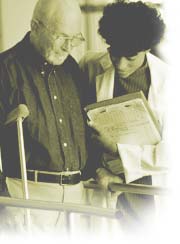
 |
The Prostate Gland Click here to see animated anatomy of Prostate and entire Genito-Urinary System. Click on the below links to get to the desired section of the page. TRANSURETHRAL RESECTION OF THE PROSTATE (TURP) PROSTATE SURGERY Transurethral resection of the prostate gland is carried out primarily to relieve obstruction. It is not the type of operation that is usually carried out in the treatment of prostate cancer. In a great majority of cases,you will be given a spinal anaesthetic. This involves the placement of a needle into your lower back and after the injection of anaesthetic drugs; you will be completely numb from the waist down.Your anaesthetist will discuss this further with you. The operation is performed by passing a telescopic instrument in through the eye of the penis and down the urethra into the area of the prostate. The internal lining of the bladder is also routinely inspected. A special electric knife is used to cut pieces of the prostate out and these pieces can then be flushed out. At the end of the procedure, a catheter (a plastic tube that drains urine from the bladder) is placed and usually kept in place from anything between one to three days after the surgery. Whilst the catheter is in place, irrigating fluid can be instilled at the same time as the urine drains into a bag. The nurses will change the irrigating fluid and bag at regular intervals. The operation takes on average around 45-60 minutes to perform and the usual length of stay in hospital is in the vicinity of 2-3 days. RISKS OF SURGERY There is a very high success rate associated with TURP, however like any surgery, there are still risks that need to be considered. The risks of having significant bleeding is very small and it is very uncommon for anybody to require a blood transfusion.There is a small risk of developing an infection in the urine, although this risk is minimised by the routine administration of antibiotics at the time of surgery. There is a tiny risk of being rendered incontinent, which means that you would not have any control over your urine at all. This is fortunately a rare complication (less than 0.5%) and even in this unlikely event, treatment is available. There is an approximately an 8-10% chance that you will lose your ability to have a penile erection and again in this event, there are very effective treatments available. A relatively common side effect of the surgery is what is known as retrograde ejaculation – this refers to the absence of any fluid when you have a sexual orgasm. Following surgery, it is usual to have irritative urinary symptoms. In particular you can expect to have frequency of urination, urgency and initially you might even find it difficult to reach the toilet in time. It is not uncommon to see some blood in the urine for up to a couple of weeks after the operation and if you do see blood, you should increase your oral fluid intake to at least two to three litres of fluid per day (unless you have any medical reason not to do so) and you can back off on your fluid intake if your urine is clear. If you develop excessively bright blood in your urine or experience an inability to pass urine, you should contact the doctor who performed your surgery. RESUMPTION OF NORMAL ACTIVITIES It is critically important to avoid any activity that involves straining or exertion for at least four weeks. Such activities include heavy lifting (for example, grocery shopping, picking up children etc). During this time you should not mow the lawn or play any sports that may involve some exertion such as golf or tennis. You may resume driving a motor vehicle after two weeks. You should initially commence this with small trips and you should avoid any long car trips for at least four weeks. You should try to have plenty of fibre in your diet and should you experience any problems with constipation, it is critically important that you do not strain and if you require help, you should see your pharmacist or family doctor. You should avoid any sexual activity for the next four weeks. There is no restriction on walking. |
|||||||
| Dial 000 in an emergency | Home :: Feedback :: Privacy :: Disclaimer | |||||||
Copyright © 2002 Urological Cancer Organisation